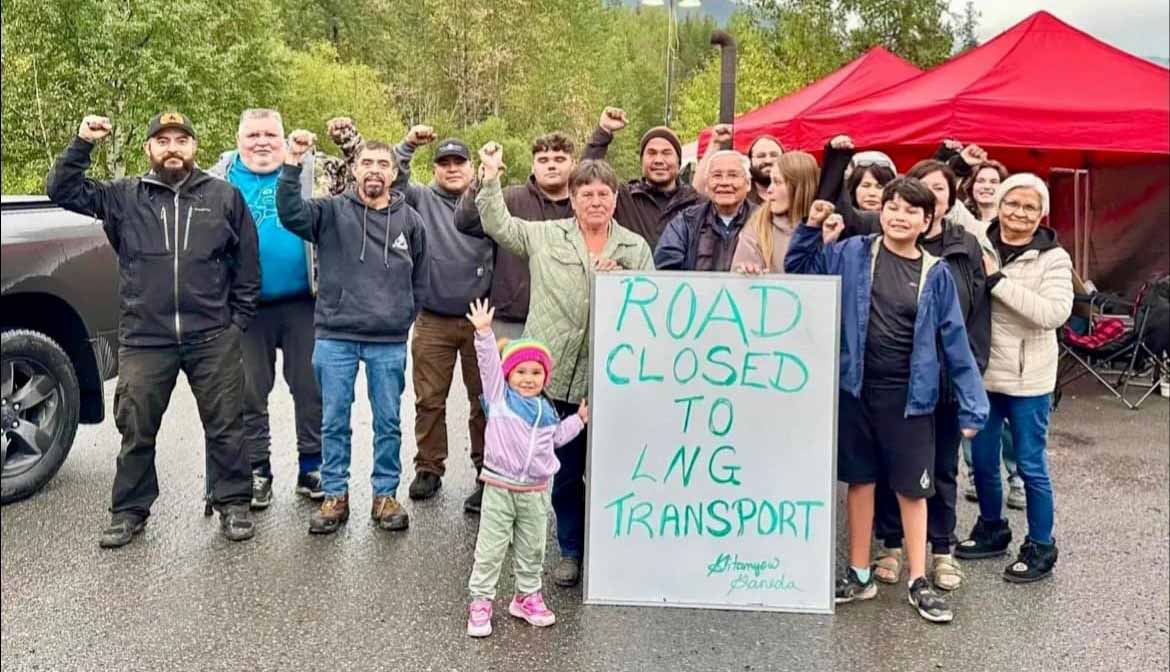Two hereditary chiefs in northwestern British Columbia are demanding a new environmental assessment be done before a liquified natural gas pipeline is built in their territories. On Aug. 22, they burned an agreement between the previous owner of the pipeline and their clans and put up a blockade on a logging road approximately 160 km from Smithers, B.C. Hereditary Chief Deborah Good calls the blockade the “Ganeda Injunction.”
“There’s a whole slew of concerns and those concerns are minimized, not only by the federal and provincial governments, but are also minimized, especially by PGRT which is Prince Rubert gas,” Good said.
According to Western LNG, a company based in Houston, Tx., along with the Nisga’a Nation and Rockies LNG, it’s developing its “first floating LNG production facility on the upper coast of British Columbia, Canada. Ksi Lisims LNG (pronounced s’lisims), meaning “from the Nass River” in the Nisga’a language, is a proposed 12-million-tonne-per-year LNG project at Wil Milit on the northern tip of Pearse Island near the Nisga’a village of Gingolx.”
The company said the project is currently undergoing an environment assessment by the B.C. government.
APTN reached out to the B.C. Environment Minister and received this statement:
“Our government is committed to upholding robust environmental protections and strong partnerships with First Nations. The Environmental Assessment Office is currently undertaking an environmental assessment amendment review to assess any potential effects related to the proposed amendment for the Prince Rupert Gas Transmission (PRGT) project. This includes consulting with First Nations, as well as working with a Technical Advisory Committee, federal and local government, and the public. We will ensure that the Gitanyow continue to have opportunities to provide information, that information will be reviewed as part of the environmental assessment process. We will continue to work with the Gitanyow and others as the environmental assessment continues. The EA process includes the determination of whether the project has been substantially started by the November 25, 2024, expiration date. The review process will be consultative and open. The Ministry of Indigenous Relations is supporting these efforts and is also committed to a respectful and collaborative process.”
“We are stopping PRGT from coming through the territory. A few days ago we stopped eight camp trailers. We stop any vehicles that are PRGT related,” she said.
Good said there is no confrontation and they are there peacefully.
Wil Marsden is the highest clan chief of the four clans on the territory which they say is unceded. The Ganeda is the frog clan. He told APTN he has concerns with the use of fresh water in the production of the natural gas and says they will be conducting their own environmental impact assessment.
“We can’t have a bunch of older folks making decisions that aren’t going to impact them—we want to protect the kids,” Marsden said.
Good said her community’s concerns are “minimized by the Nisga’a because they claim that this entire territory belongs to them.”
“We never ceded our territory to government and yet they come and tell us this is Crown land.” Good said. “We never ceded our territories to the Nisga’a and they say this is their land.”
Good and Marsden said there are environmental concerns related to the pipeline, which will cross much of their territory. She’s also concerned about a liquefied natural gas processing facility being constructed at Ksi Lisims on Pearse Island, where there’s an important fish habitat.
Marsden said he is also concerned with the large “man camp” that’s being built to house the pipeline workers.
“The man camp, the size has increased. In the last five years it’s doubled or tripled. The industrial impact on our farms is a concern.”
Good maintains the focus should be on the future.
“The focus is the seven generations that are coming after me. That they will have their land, that they will have their fish, and they will have their wildlife. Money comes and goes” Good said. “If we release the land to just one part of industry, we will lose it.”
Read the original article by Leanne Sanders at APTN National News.
